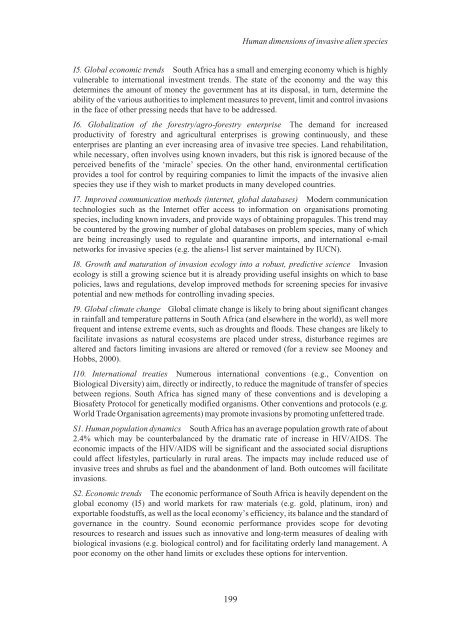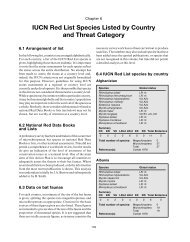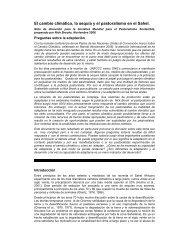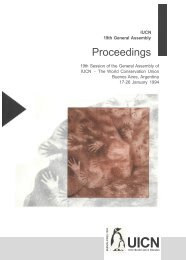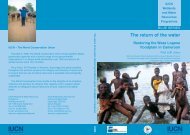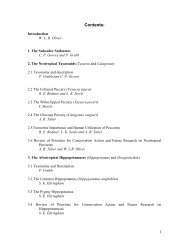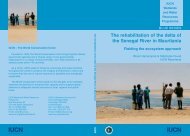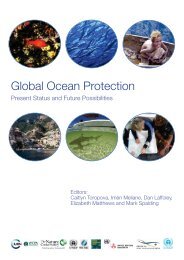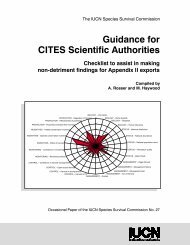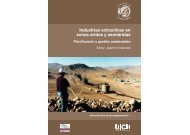Alien Species.vp - IUCN
Alien Species.vp - IUCN
Alien Species.vp - IUCN
Create successful ePaper yourself
Turn your PDF publications into a flip-book with our unique Google optimized e-Paper software.
I5. Global economic trends South Africa has a small and emerging economy which is highly<br />
vulnerable to international investment trends. The state of the economy and the way this<br />
determines the amount of money the government has at its disposal, in turn, determine the<br />
ability of the various authorities to implement measures to prevent, limit and control invasions<br />
in the face of other pressing needs that have to be addressed.<br />
I6. Globalization of the forestry/agro-forestry enterprise The demand for increased<br />
productivity of forestry and agricultural enterprises is growing continuously, and these<br />
enterprises are planting an ever increasing area of invasive tree species. Land rehabilitation,<br />
while necessary, often involves using known invaders, but this risk is ignored because of the<br />
perceived benefits of the ‘miracle’ species. On the other hand, environmental certification<br />
provides a tool for control by requiring companies to limit the impacts of the invasive alien<br />
species they use if they wish to market products in many developed countries.<br />
I7. Improved communication methods (internet, global databases) Modern communication<br />
technologies such as the Internet offer access to information on organisations promoting<br />
species, including known invaders, and provide ways of obtaining propagules. This trend may<br />
be countered by the growing number of global databases on problem species, many of which<br />
are being increasingly used to regulate and quarantine imports, and international e-mail<br />
networks for invasive species (e.g. the aliens-l list server maintained by <strong>IUCN</strong>).<br />
I8. Growth and maturation of invasion ecology into a robust, predictive science Invasion<br />
ecology is still a growing science but it is already providing useful insights on which to base<br />
policies, laws and regulations, develop improved methods for screening species for invasive<br />
potential and new methods for controlling invading species.<br />
I9. Global climate change Global climate change is likely to bring about significant changes<br />
in rainfall and temperature patterns in South Africa (and elsewhere in the world), as well more<br />
frequent and intense extreme events, such as droughts and floods. These changes are likely to<br />
facilitate invasions as natural ecosystems are placed under stress, disturbance regimes are<br />
altered and factors limiting invasions are altered or removed (for a review see Mooney and<br />
Hobbs, 2000).<br />
I10. International treaties Numerous international conventions (e.g., Convention on<br />
Biological Diversity) aim, directly or indirectly, to reduce the magnitude of transfer of species<br />
between regions. South Africa has signed many of these conventions and is developing a<br />
Biosafety Protocol for genetically modified organisms. Other conventions and protocols (e.g.<br />
World Trade Organisation agreements) may promote invasions by promoting unfettered trade.<br />
S1. Human population dynamics South Africa has an average population growth rate of about<br />
2.4% which may be counterbalanced by the dramatic rate of increase in HIV/AIDS. The<br />
economic impacts of the HIV/AIDS will be significant and the associated social disruptions<br />
could affect lifestyles, particularly in rural areas. The impacts may include reduced use of<br />
invasive trees and shrubs as fuel and the abandonment of land. Both outcomes will facilitate<br />
invasions.<br />
S2. Economic trends The economic performance of South Africa is heavily dependent on the<br />
global economy (I5) and world markets for raw materials (e.g. gold, platinum, iron) and<br />
exportable foodstuffs, as well as the local economy’s efficiency, its balance and the standard of<br />
governance in the country. Sound economic performance provides scope for devoting<br />
resources to research and issues such as innovative and long-term measures of dealing with<br />
biological invasions (e.g. biological control) and for facilitating orderly land management. A<br />
poor economy on the other hand limits or excludes these options for intervention.<br />
199<br />
Human dimensions of invasive alien species


